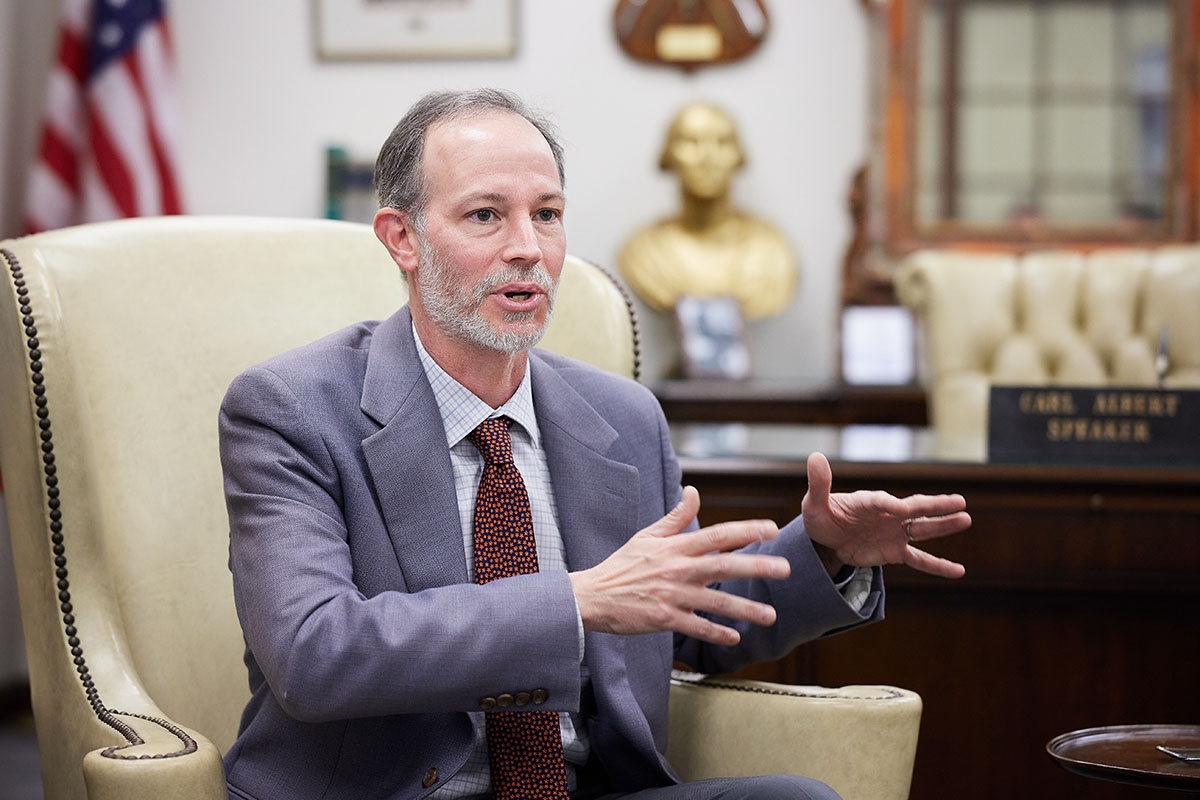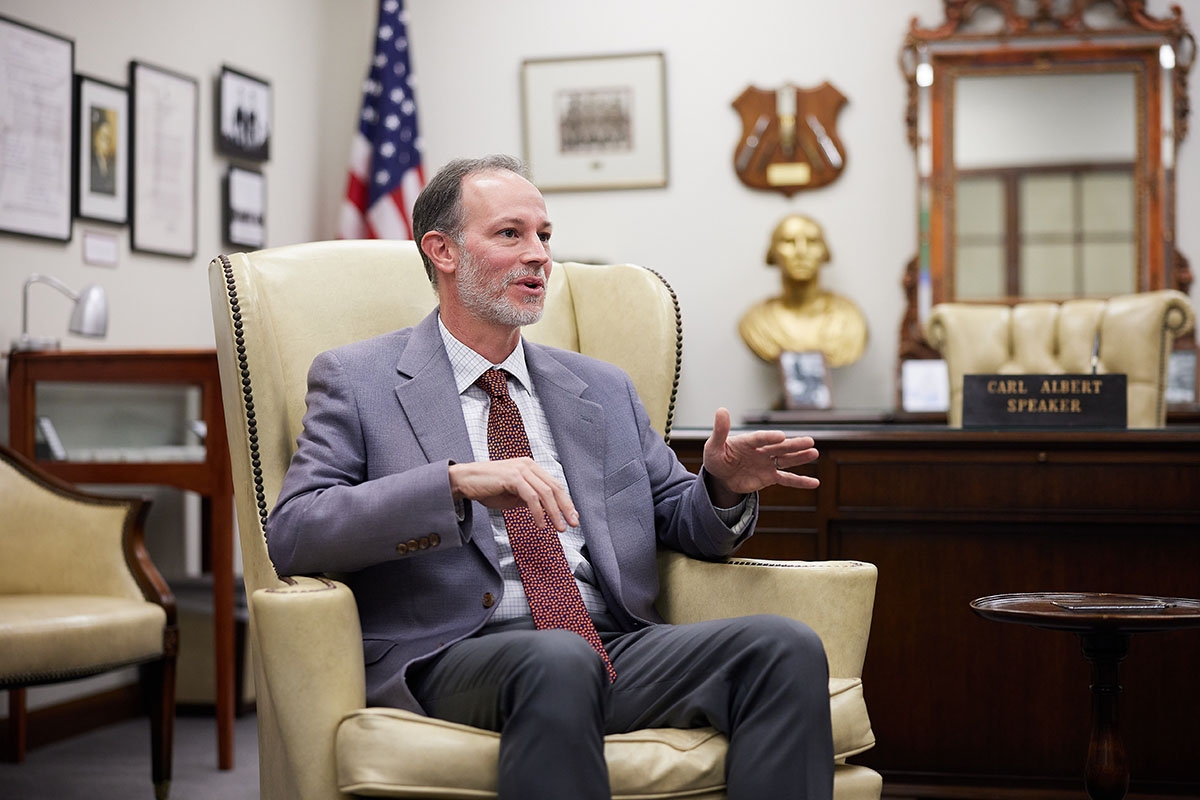
Sixteen states, including Oklahoma, enter the voting booth on March 5, or “Super Tuesday,” to cast their ballot for the presidential primary election. While the 2024 primary election may hold little intrigue compared to the past, Super Tuesday still stands as a barometer for what you can expect for the general election.
In a day where the largest number of states are voting, candidates on either side will have a clearer picture of their standing in the race as candidates from each party win more electors from more states.
This Super Tuesday has been unique in the sense that voters may perceive that the Republican and Democratic candidates are set. Campaigning within the state has notably been absent.
Just like in 1988 when Oklahoma decided to join Super Tuesday, Oklahomans can still help influence the national conversation in presidential politics.
University of Oklahoma political science professor Michael Crespin said we can still learn a lot from Tuesday’s results. Crespin’s research focuses on legislative politics, congressional elections and political geography.
Crespin explained that voting results in this year’s presidential primaries will show potential voter divisions and candidates’ potential weaknesses.
“When you think about the Democratic side, Super Tuesday will show us the support for (President Joseph) Biden and the strength of his support,” Crespin said. “On the Republican side, it will show the weakness of (former President Donald) Trump. For instance, if he only receives 60% of the vote, that will be enough to win, but it shows a weakness.
“If an incumbent president is getting 60% of the vote in the primaries, that’s a tremendous weakness,” Crespin said. “That might be when a candidate decides to step down. Normally, it doesn’t get to that.”
“Super Tuesday is an opportunity for people to express their preference,” added Crespin, who also serves as director and curator of OU’s Carl Albert Congressional Research and Studies Center, a nonpartisan institution that strengthens representative democracy through scholarship, learning, and service. “If there’s one set of preferences that elected officials actually pay attention to, it’s the actual vote count.”
Until 1988, Oklahoma voted later in the nomination season before joining the slate of states with primaries on Super Tuesday. The reasoning, Crespin notes, stemmed from Oklahoma’s desire to be more visible in the presidential election and to bring candidates to the state to campaign.
Most recently, former President Donald J. Trump campaigned in Tulsa during his campaign as the incumbent in 2020. Trump also visited the state during his initial run in 2016, as did other former candidates including former Vice President Al Gore and former President George Bush.
Super Tuesday’s aim is to help the race become clearer.
“One of the goals behind Super Tuesday was for it to be decisive,” Crespin said. “Ideally, you want a clear picture of who the winner will be, or you simply want to narrow the field down.”
Regardless of the outcome on Tuesday, Oklahoma will share center stage with over a dozen states. The results of Super Tuesday will help provide a clearer path for the spring and summer months before the general election in November.
Tuesday’s results brought much needed clarity to the presidential election. Strong support of both the major party leaders all but confirm a rematch of the two for the 2024 presidential election.
Former President Trump further distanced himself from his competitor Nikki Haley, who has since suspended her campaign. 1,215 delegates are needed to earn the party’s official nomination for president – Trump won 995 of them.
The state of Oklahoma’s 37 delegates went to Trump, who won 81.8% of the vote (254,688 votes) to Haley’s 15.9% (49,373).
Crespin notes that while Trump’s big Tuesday turnout surprised few, there are still some hurdles to follow as we move closer to the general election.
“Former President Trump did well as expected,” Crespin said. “Winning all the Super Tuesday contests except for Vermont. However, he showed weakness amongst Republican voters with college degrees and in the suburbs.”
Crespin added that he did not believe Haley would announce her support of Trump today.
President Biden’s Super Tuesday went as expected with little to no competition. Biden secured all participating state’s delegates and only lost out to little-known Jason Palmer for the vote in American Samoa.
66,824 voters in Oklahoma supported Biden, who totaled 73% of the vote and gained the state’s 29 delegates.
Crespin pointed out a trend to follow on the Biden side, whereprotest votes within Minnesota, Colorado and North Carolinaoccurred with votes of “uncommitted” or “no preference.”
Both men won convincingly, but there is still a lot of work to be done to reach the White House.
This story has been updated with additional information.
By Brady Trantham
Photos by Travis Caperton

From Sooner Magazine: Celebrating 100 years and generations of OU artistic expression.
“The Outsiders,” featuring the contributions of three University of Oklahoma alumni, won Best Musical at the 77th Annual Tony Awards. The production, which received 12 nominations, was celebrated at the ceremony at the David H. Koch Theater at Lincoln Center for the Performing Arts on June 16.
The Fred Jones Jr. Museum of Art has opened "Un/Natural Selections: Wildlife in Contemporary Art," an exhibit organized by the National Museum of Wildlife Art, running through Sept. 22.